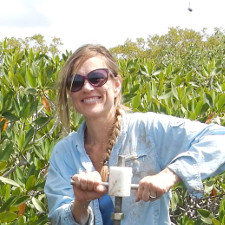Hilary Flower
Associate Professor of Environmental Studies, Eckerd College, St Petersburg, FL
Courtesy Associate Professor, University of South Florida

My research pursues the questions: As sea level rise and climate change increasingly threaten low-lying states like Florida, what are the ecological consequences? And how can we build resilience to a ramp disturbance that is unprecedented and uncertain? The Everglades is the testing ground for my work, because the needs for actionable science are pressing, and I feel a strong personal connection to the landscape and its wildlife. My work is funded by the National Science Foundation as part of the Florida Coastal Everglades Longterm Ecological Research Project.
I have applied a range of tools to address my overarching questions. I have done field work, benchtop geochemistry experiments and geochemical modeling to investigate how saltwater intrusion into coastal aquifers will affect nutrient availability in overlying estuaries as sea level rises.
I am currently working on a series of numerical modeling projects at the landscape-scale using the Everglades Landscape Model. Our recent (2017 and 2019) papers offered glimpses of three possible ecological responses for the Everglades under different sea level rise and climate change scenarios. I am expanding upon this research through investigations into the geochemical reactions that govern nutrient release when seawater intrudes in coastal aquifers.
Whether I’m working on the molecular or landscape scale, I thrive on the cycle of curiosity and discovery. I am dedicated to dissolving barriers for people from underrepresented groups to bring their talents and brain-power to further push the boundaries of scientific knowledge.
Specialty Areas
Hydrogeology, ecohhydrology, computer modeling (landscape, hydrodynamic and geochemical), climate change
Education
- University of South Florida, Tampa
- PhD Geology, School of Geosciences, 2015
- University of California, Santa Barbara
- MS Geology, 1995
- University of Virginia, Charlottesville
- BA English Literature
Publications
- Flower H., Rains M., Taşcı Y., Zhang J-Z, Trout K, Lewis DB, Das A, Dalton R (2022) Why is calcite a strong phosphorus sink in freshwater? Investigating the adsorption mechanism using batch experiments and surface complexation modeling.Chemosphere 286:131596 Article
- Lewis D., Jimenez K., Abd-Elrahman A, Andreu M, Landry SM, Northrop RJ, Campbell C, Flower H., Rains M., Richards CL (2021) Total and mobile fractions of carbon and nitrogen in surface soils across a mangrove salt marsh ecotone.Science of the Total Environment
- Flower, H., Rains, M., Fitz, C., Orem, W., Newman, S., Osborne, T., Ramesh Reddy, K., & Obeysekera, J., (2019). Shifting Ground: Landscape-Scale Modeling of Biogeochemical Processes under Climate Change in the Florida Everglades. Environmental Management 64: 416-435. Article
- Flower, H., Rains, M., & Fitz, C. (2017). Visioning the Future: Scenarios Modeling of the Florida Coastal Everglades. Environmental Management 60.5: 989-1009.
- Flower, H., Rains, M., Lewis, D., Zhang, J. Z., & Price, R. (2017). Saltwater intrusion as potential driver of phosphorus release from limestone bedrock in a coastal aquifer. Estuarine, Coastal and Shelf Science, 184, 166-176.
- Flower, H., Rains, M., Lewis, D., & Zhang, J. Z. (2017). Rapid and intense phosphate desorption kinetics when saltwater intrudes into carbonate rock. Estuaries and Coasts, 40(5), 1301-13.
- Flower, H., Rains, M., Lewis, D., Zhang, J. Z., & Price, R. (2016). Control of phosphorus concentration through adsorption and desorption in shallow groundwater of subtropical carbonate estuary. Estuarine, Coastal and Shelf Science, 169, 238-247.
- Flower, H., (2015) "Phosphorus Sorption Dynamics in Shallow Groundwater, Coastal Everglades, Florida, USA."
